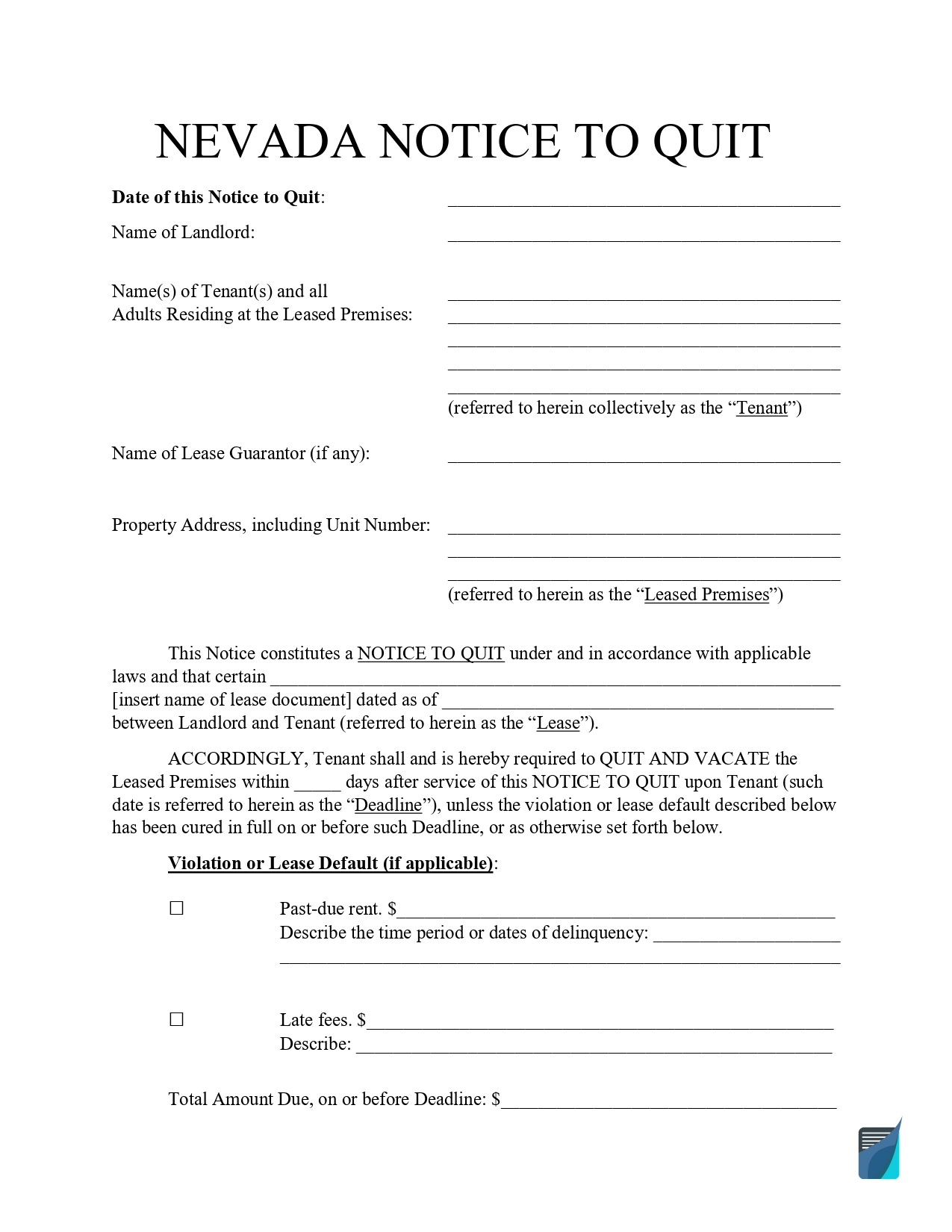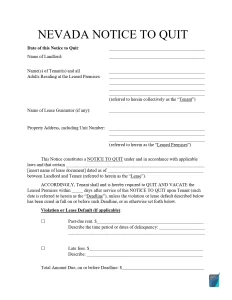Nevada Eviction Notice Forms
The Nevada eviction notice is a legal form that a landlord uses to remove a tenant from a rental property. This form is required when a tenant has not complied with the terms of the agreement, such as failing to pay rent on time or violating other terms of the lease. In Nevada, the type of eviction notice template used depends on the reason for the removal.
There are various grounds on which a property owner might find eviction necessary. Often, a tenant may fail to fulfill their obligation to pay rent on the agreed schedule. In other situations, a property owner might require the premises to be vacated to sell the property or lease it to a different person. In any case, landlords must follow the legal procedures outlined in Nevada law when issuing an eviction notice. It’s about properly serving the form to the tenant and providing the correct timeframe for response based on the type of violation.

Build Your Document
Answer a few simple questions to make your document in minutes
Save and Print
Save progress and finish on any device, download and print anytime
Sign and Use
Your valid, lawyer-approved document is ready
Nevada Eviction Laws
Nevada’s eviction laws are outlined in various sections of the Nevada Revised Statutes (NRS), providing a framework for landlords and tenants to understand their rights and obligations. For example, NRS 40.2512 addresses the issue of non-payment of rent, stating that a tenant is guilty of unlawful detainer if they remain in possession of the property after failing to pay rent within a specified period following a written notice. Except for commercial premises, this period is set at seven judicial days for real property.
Here are the main causes that can lead to eviction under Nevada law:
- Non-payment of rent. As per NRS 40.2512, failure to pay rent within seven judicial days after receiving notice can lead to eviction.
- Violation of lease terms. According to NRS 40.2516, eviction proceedings may commence if a tenant fails to perform any condition or covenant of the lease other than a rent payment, and this failure continues for five days after notice.
- Illegal activity. NRS 40.2514 specifies that engaging in illegal activities and not vacating the property within three days of notice are grounds for eviction.
In cases where a tenant continues to occupy the property without the landlord’s consent after a lease has expired, as detailed in NRS 40.2516, landlords are required to provide at least 30 days’ notice for most periodic tenancies, except under certain circumstances outlined in subsection 2 of the statute.
Nevada Eviction Notice Laws Details
| Rent Grace Period | Not Specified |
| Notice of Non-Payment | 7 days |
| Notice of Non-Compliance | 5 days |
| State Laws | Nevada Revised Statutes, Sections 40.215 to 40.425 |
Eviction Notice Types Used in Nevada
Each notice is integral to eviction and tailored to address specific circumstances under Nevada law.
Notice for Nonpayment of Rent
Under NRS 40.2512, the landlord must issue a 7-day notice to pay or quit if a tenant fails to pay rent. This notice gives the tenant seven days to pay the overdue rent or vacate the property. Landlords must serve this notice properly to initiate the eviction process for nonpayment.
Notice for Lease Violations
As stipulated in NRS 40.2516, tenants who do not adhere to the lease conditions are served a 5-day notice to cure or quit. This notice allows five days for the tenant to correct the issue or leave the property. This form applies to various lease violations, excluding nonpayment.
Notice for Illegal Activities
In cases of illegal activities, per NRS 40.2514, a tenant is given a 3-day notice to surrender. This option is specifically for violations involving illegal actions defined in the statute (NRS 453.011 to 453.552, except for NRS 453.336), demanding the tenant vacate the premises within three days.
Notice for Indefinite Lease Termination
According to NRS 40.251, tenants on an indefinite lease (such as month-to-month rentals) must be notified to vacate, typically requiring at least 30 days. This notice is necessary when the landlord does not wish to continue renting under the existing terms without a fixed end date and requires tenant compliance to vacate the property within the specified period.

Eviction Process in Nevada
The eviction process in Nevada is structured to ensure that all parties receive fair treatment under the law.
Delivering Eviction Notice
The eviction process begins when the landlord issues an eviction notice to the tenant. This notice varies based on the type of violation, such as nonpayment of rent, lease violations, illegal activities, or termination of an indefinite lease. The notice must be legally served to the tenant, informing them of the specific violation and the time frame to rectify the issue or vacate the property.
Waiting Period
After the eviction notice is served, the landlord must wait for the period specified in the notice (typically 3, 5, or 30 days) to allow the tenant to address the issue. If the tenant pays the overdue rent, corrects the lease violation, or voluntarily vacates the property within this period, further legal action may not be necessary.
Filing an Eviction Lawsuit
If the tenant fails to comply with the notice, the landlord’s next step is to file an eviction lawsuit in the appropriate court. This legal action formally begins obtaining a court order for eviction. The landlord must provide all necessary documentation and evidence of the lease violation and the properly served eviction notice.
Court Hearing and Eviction Order
The final step involves a court hearing, where the landlord and tenant present their cases. If the judge rules in favor of the landlord, an eviction order will be issued. This order authorizes the landlord to regain possession of the property. If the tenant refuses to leave, law enforcement may enforce the eviction order and remove the tenant from the property.

Use our document builder to customize any template on FormsPal to your preferences. Here is a number of some other widely-used Nevada forms we provide.
Other Eviction Notice Forms by State